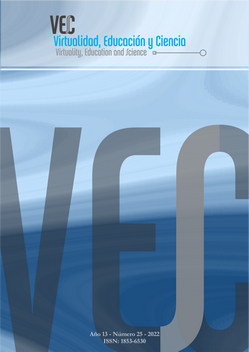The use of the technological resources that the students of the Final Work Seminar of the Bachelor´s Degree in Education have
DOI:
https://doi.org/10.60020/1853-6530.v13.n25.37702Keywords:
ICT, platforms, contents, educationAbstract
This article shows the first results obtained in the research project "Didactic tools and technological resources that are used within the seminar to motivate and increase the research competences in the students of the Final Project of the Bachelor's Degree in Education", carried out by teachers of such career taught at Siglo 21 University, in 2020. From a quantitative perspective, a survey was answered by 207 students who took and/or passed the Final Work Seminar. This first stage focused on the students' knowledge of Technologies, the use of networks, educational platforms and their own assessment of the seminar, the contents, the teaching materials and the career level. We start from the assumption that students know about technologies, but apply them sparingly in their professional practice. The results obtained allow to reinforce the use of ICTs especially in the elaboration of their activity plan and, from their comments, to identify what hinders or facilitates the development of their research skills.
Downloads
References
ÁREA MOREIRA (2005). “La Escuela y la Sociedad de la Información”. En Nuevas tecnologías, globalización y migraciones. Barcelona: Editorial Octaedro. Pp. 1-24. Disponible en https://manarea.webs.ull.es/materiales/udtic/Escuela-SocInformacion.pdf
CABERO, J. (2007). Las necesidades de las TIC en el ámbito educativo: oportunidades, riesgos y necesidades. Tecnología y Comunicación Educativas, 21(45), 5-19.
ESPINOZA FREIRE, E: RIVERA RIOS, A; TINOCO CUENCA, N. (2016) Formación de competencias investigativas en los estudiantes universitarios. Redalyc. Atenas, vol. 1, núm. 33, ISSN: 1682-2749. https://www.redalyc.org/jatsRepo/4780/478049736004/478049736004.pdf
FERNÁNDEZ, A M. D. (2016). Modelo educativo emergente en las buenas prácticas TIC. Revista Fuentes, 18(1), 33–47. Recuperado de https://revistascientificas.us.es/index.php/fuentes/article/view/281
GÓMEZ COLLADO, M. E.; CONTRERAS OROZCO, L.; GUTIÉRREZ LINARES, D. (2016) El impacto de las tecnologías de la información y la comunicación en estudiantes de ciencias sociales: un estudio comparativo de dos universidades públicas. Innovación Educativa, vol. 16, núm. 71, pp. 61-80 Instituto Politécnico Nacional Distrito Federal, México. https://www.redalyc.org/articulo.oa?id=179446997004
HARO, J. J de. (2009). Las redes sociales aplicadas a la práctica docente. DIM: Didáctica, Innovación y Multimedia, (13). Disponible en https://www.raco.cat/index.php/DIM/article/view/138928 [Consulta: 17-03-2021].
GÓMEZ COLLADO, M.; CONTRERAS OROZCO, L. y GUTIÉRREZ LINARES, D. (2016). El impacto de las tecnologías de la información y la comunicación en estudiantes de Ciencias Sociales: un estudio comparativo de dos universidades públicas. Innovaciones educativas (Méx. DF), 16(71). Disponible en http://www.scielo.org.mx/scielo.php?script=sci_arttext&pid=S1665-26732016000200061
GÓMEZ, M.; ROSES S. y FARÍAS, P. (2012). El uso académico de las redes sociales en universitarios. Revista científica de educomunicación, 38(19), 131-138. Disponible en https://www.academia.edu/9238108/El_uso_acad%C3%A9mico_de_las_redes_sociales_en_universitarios
JAMA ZAMBRANO, V. y CORNEJO ZAMBRANO, J. (2016). Los recursos tecnológicos y su influencia en el desempeño de los docentes. Universidad laica “Eloy Alfaro” de Manabí, Chone, Ecuador. Chone, Ecuador: Unidad Educativa Cinco de Mayo. Disponible en https://www.dominiodelasciencias.com/ojs/index.php/es/article/download/316/377
LEVY, P. (2007). Cibercultura: La cultura de la sociedad digital. Informe al Consejo de Europa. México: Anthropos Editorial. Universidad Autónoma Metropolitana. Iztapalapa. ISBN 978-84-7658-808-6
PRENSKY, M. (2010). Nativos e Inmigrantes Digitales. Cuadernos SEK 2.0 [Institución Educativa SEK], 1-23. Recuperado de https://marcprensky.com/writing/Prensky-NATIVOS%20E%20INMIGRANTES%20DIGITALES%20(SEK).pdf
ROBLES, A. y GALLARDO, M. Á. (2013). Entornos virtuales de aprendizaje: Nuevos retos educativos. Revista Científica electrónica de Educación y Comunicación en la sociedad del conocimiento, 13(2), 260-272. Recuperado de: http://www.researchgate.net/profile/Miguel_Gallardo_Vigil/publication/259949594_Entornos_virtuales_de_aprendizaje_nuevos_retos_educativos/links/02e7e52ea9a6ff1d00000000.pdf
ROIG-VILA, R (Ed.) (2017). Investigación en Docencia Universitaria. Diseñando el futuro a partir de la innovación educativa. Barcelona: Editorial Octaedro S.L. Pp. 554-565. http://www.untumbes.edu.pe/vcs/biblioteca/document/varioslibros/0893.%20Investigaci%C3%B3n%20en%20docencia%20universitaria.%20Dise%C3%B1ando%20el%20futuro%20a%20partir%20de%20la%20innovaci%C3%B3n%20educativa.pdf
Published
How to Cite
Issue
Section
License

This work is licensed under a Creative Commons Attribution-NonCommercial 4.0 International License.
The generation of derivative works is allowed as long as it is not done for commercial purposes. The original work may not be used for commercial purposes.


